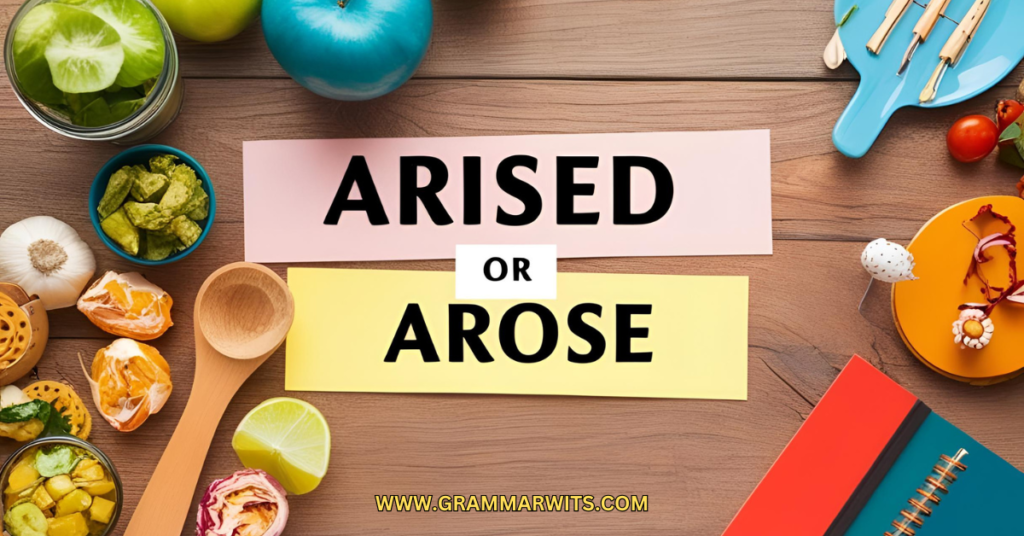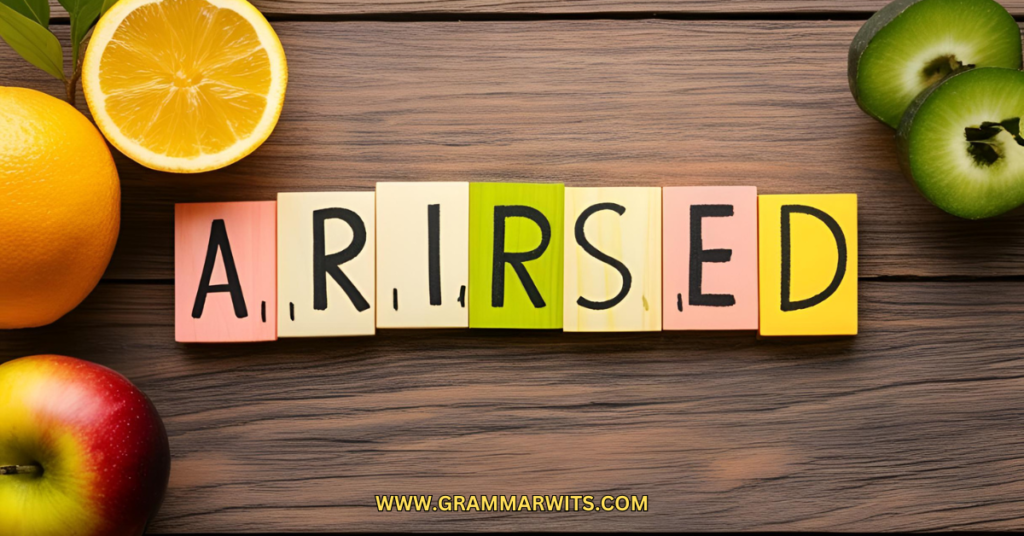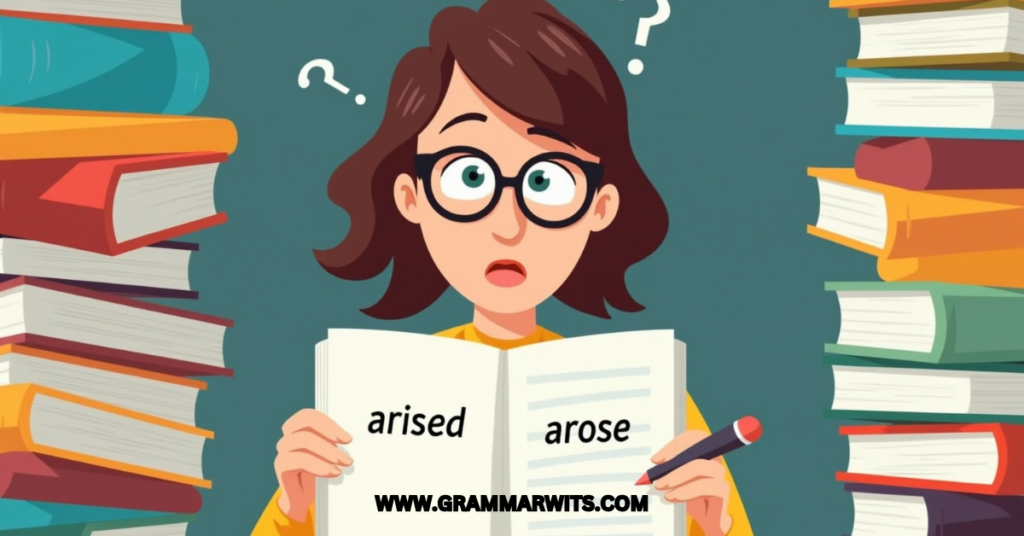Introduction: The Arise Dilemma
Arised or Arose Correct Past Tense of Arise refers to the grammatical clarification between two forms often confused when conjugating the irregular verb “arise.” While “arised” may appear to follow regular past tense patterns, it is not recognized in standard English. The correct past tense of “arise” is “arose,” which accurately conveys an event or situation that emerged or came into existence in the past. This distinction is essential for proper usage in writing, speaking, and grammar instruction. Many students search online to understand whether Arised or Arose Correct Past Tense of Arise is the right grammar rule.
In the fast-paced world of digital communication, where every word matters, using incorrect verb forms can instantly weaken credibility. Whether you’re writing an email, preparing a presentation, or crafting academic content, mastering the finer details of verb usage—especially irregular ones—can make your language sharper and more authoritative. Getting it right isn’t just about grammar—it’s about communicating with clarity and confidence. The article explains the difference between Arised or Arose Correct Past Tense of Arise in simple English.
Understanding the difference between “arised” and “arose” helps eliminate one of the most frequent errors in English grammar. This guide will unpack the confusion, explain why “arise” is an irregular verb, and show exactly how to use its past tense form. If you’re looking to refine your language skills and avoid common grammatical pitfalls, this breakdown offers everything you need to master the correct usage of “arise” once and for all. To avoid mistakes in writing, it’s important to learn Arised or Arose Correct Past Tense of Arise.
In this comprehensive guide, we’ll explore everything you need to know about the verb “arise,” its conjugation across all tenses, why “arose” is correct, and practical strategies to remember this rule. By the end, you’ll never hesitate between “arose” and “arised” again.
The Verb “Arise” Explained

Before diving into conjugation rules, let’s establish a clear understanding of what “arise” actually means.
Arise functions as an intransitive verb, meaning it doesn’t take a direct object. It comes from ancient Germanic origins and carries several distinct meanings depending on the context:
- Literal meaning: To get up, stand up, or move upward
- Figurative meaning: To come into existence, to emerge or become apparent
- Situational meaning: To occur or happen as a result of something
What sets “arise” apart from similar verbs like “rise” or “raise” is its implication of emergence or origination. When problems “arise,” they come into being. When opportunities “arise,” they present themselves unexpectedly.
Common phrases and collocations with “arise” include:
- Issues that arise
- Questions that arise
- Opportunities that arise
- Needs that arise
- Situations that arise
Understanding these nuances helps us appreciate why “arise” maintains its irregular conjugation pattern—it’s a fundamental, ancient verb that resisted standardization as English grammar evolved. Teachers often correct students on the topic of Arised or Arose Correct Past Tense of Arise during grammar lessons.
Conjugating “Arise” Correctly
To master the verb “arise,” you need to understand its complete conjugation pattern across all tenses. Here’s a comprehensive breakdown:
| Tense | Form | Example |
|---|---|---|
| Present Simple | arise/arises | I arise early on weekends. She arises at dawn. |
| Present Continuous | am/is/are arising | They are arising to the challenge. |
| Past Simple | arose | The issue arose during the meeting. |
| Past Continuous | was/were arising | Concerns were arising about the project timeline. |
| Present Perfect | have/has arisen | Several questions have arisen from the proposal. |
| Past Perfect | had arisen | The problem had arisen before they noticed. |
| Future Simple | will arise | New opportunities will arise next quarter. |
| Future Perfect | will have arisen | By next year, new technologies will have arisen. |
| Future Continuous | will be arising | Issues will be arising as we implement the plan. |
As you can see, the simple past tense form is “arose,” and the past participle form is “arisen.” These irregular forms follow historical patterns rather than the standard “-ed” ending you might expect. If you’re unsure, this guide will help you with Arised or Arose Correct Past Tense of Arise and how to use it properly.
Why “Arose” Is Correct (And “Arised” Is Wrong)

The question remains: why is “arose” correct when “arised” seems to follow the more common pattern of regular verbs?
The answer lies in the historical development of English. “Arise” belongs to a special class of Germanic languages verbs known as “strong verbs.” Unlike “weak verbs” that form their past tense with a dental suffix (-d or -t), strong verbs change their vowel sound—a process linguists call “ablaut.”
Irregular verbs like “arise” follow inherited patterns from Old English that have persisted through centuries of linguistic evolution. “Arise” follows the same pattern as these similar verbs:
- Rise → Rose → Risen
- Write → Wrote → Written
- Drive → Drove → Driven
Notice the vowel change pattern: “i” in the present changes to “o” in the past and “i” again in the past participle.
People incorrectly form “arised” because our brains naturally attempt to apply the more common pattern—adding “-ed” to form past tenses. Over 90% of English verbs follow the regular pattern, so this instinct is understandable. However, the most common verbs in English (be, do, have, say, go, etc.) tend to be irregular, which adds to the confusion.
“The fact that irregular verbs are often among the most frequently used in the language is no coincidence—their high usage rates helped preserve their irregular forms against the pressure to regularize.” — David Crystal, linguist and author
Memory Tricks for Mastering “Arose”

Learning irregular verbs requires more deliberate memorization than regular patterns. Here are some effective strategies for remembering that “arose” is the correct past tense of arise:
Pattern Recognition
Group “arise” with verbs that follow the same pattern:
- Rise → Rose
- Drive → Drove
- Write → Wrote
- Arise → Arose
Mnemonic Devices
Create a memorable phrase that links the present and past forms:
- “When the sun does arise, yesterday it arose.”
- “New challenges arise today, just as they arose yesterday.”
Visualization Technique
Picture a sunrise (arise) becoming a full morning sun (arose) and then setting behind clouds (arisen). This visual progression can help cement the correct forms in your mind.
Practice Exercises
Quick Practice: Fill in the blanks with the correct form of “arise”:
- The question _____ during the meeting yesterday. (arose)
- Similar issues have _____ in the past. (arisen)
- New opportunities _____ every day. (arise)
- Concerns were _____ about the proposal. (arising)
- By next month, additional needs will have _____. (arisen)
Real-World Examples of “Arise” vs. “Arose” in Context

Let’s examine how “arise” and “arose” appear in various contexts to solidify your understanding:
Literature Examples
- “From the midst of this darkness a sudden light arose.” — Mary Shelley, Frankenstein
- “Not enjoyment, and not sorrow, is our destined end or way; But to act, that each tomorrow find us farther than today. Art is long, and Time is fleeting, and our hearts, though stout and brave, still, like muffled drums, are beating funeral marches to the grave. In the world’s broad field of battle, in the bivouac of Life, be not like irrational, driven cattle! Be a hero in the strife! Trust no Future, howe’er pleasant! Let the dead Past bury its dead! Act,—act in the living Present! Heart within, and God o’erhead! Lives of great men all remind us we can make our lives sublime, and, departing, leave behind us footprints on the sands of time.” — Henry Wadsworth Longfellow
News Headlines
- “Tensions arose between the two countries following the diplomatic incident”
- “Questions arise over new economic policy”
- “Concerns have arisen about environmental impact”
Business Context
- “The need for restructuring arose after the merger.”
- “As new market opportunities arise, we must be prepared to act quickly.”
- “Several operational issues have arisen during the implementation phase.”
Common Mistakes Spotted “In the Wild”
❌ “The problem arised suddenly during the presentation.”
✓ “The problem arose suddenly during the presentation.”
❌ “Complications had arised before the meeting.”
✓ “Complications had arisen before the meeting.”
When to Use “Arisen” (Past Participle Form)

The past participle form “arisen” creates additional confusion for many English speakers. Unlike the simple past tense “arose,” which stands alone, “arisen” always appears with auxiliary verbs in perfect tense constructions:
Present Perfect
- “New evidence has arisen in the case.”
- “Several questions have arisen from the proposal.”
Past Perfect
- “By the time they arrived, the issue had arisen twice before.”
- “The CEO explained that concerns had arisen about the project’s viability.”
Future Perfect
- “By next quarter, new challenges will have arisen.”
- “Additional opportunities will have arisen by the time we finalize the plan.”
The difference is subtle but important: “arose” indicates a completed action in the past, while “arisen” indicates a past action with current relevance or continued importance.
Tricky Sentence Examples Solved
- “After the scandal _______, the CEO resigned.”
- Correct: “After the scandal arose, the CEO resigned.”
- Explanation: Simple past tense for a completed action
- “Issues that have _______ require immediate attention.”
- Correct: “Issues that have arisen require immediate attention.”
- Explanation: Present perfect indicating past actions with current relevance
- “The question had already _______ before you mentioned it.”
- Correct: “The question had already arisen before you mentioned it.”
- Explanation: Past perfect indicating an action completed before another past action
Pronunciation Guide: Saying It Right
Proper pronunciation enhances your mastery of “arise” and its forms:
- Arise: /əˈraɪz/ — Stress on the second syllable with a long “i” sound
- Arose: /əˈroʊz/ — Stress on the second syllable with a long “o” sound
- Arisen: /əˈrɪzən/ — Stress on the second syllable with a short “i” sound
The key pronunciation shift from “arise” to “arose” is the vowel change from /aɪ/ (like in “mine”) to /oʊ/ (like in “go”).
Regional variations exist, particularly in vowel length and stress patterns:
- American English tends to pronounce “arose” with a slightly longer “o” sound.
- British English often features a slightly shorter, crisper “o” sound.
Etymology and Evolution of “Arise”

The journey of “arise” through linguistic history explains why it maintains its irregular form today:
Old English: The verb began as “ārīsan,” already an irregular verb with the past tense form “ārās.”
Middle English: The form evolved to “arisen” with the past tense “aros.”
Modern English: Finally settled as “arise” with past tense “arose.”
Throughout this evolution, the fundamental pattern of vowel change (ablaut) remained consistent, demonstrating how deeply ingrained these patterns are in the language’s structure.
Interesting historical usage shows that “arise” once had broader applications than it does today. In Shakespeare’s works, for instance, “arise” often carried connotations of nobility or ascension to power:
“Some are born great, some achieve greatness, and some have greatness thrust upon them. Thy Fates open their hands. Let thy blood and spirit embrace them. And, to inure thyself to what thou art like to be, cast thy humble slough and appear fresh.” — Twelfth Night
The persistence of irregular forms like “arose” highlights the fascinating tension in language between regularity and irregularity—a linguistic tug-of-war between simplification and tradition.
Similar Troublesome Irregular Verbs
“Arise” isn’t alone in causing confusion. Here’s a chart of commonly confused irregular verbs with similar patterns:
| Present | Past | Past Participle | Common Error |
|---|---|---|---|
| Arise | Arose | Arisen | ❌ Arised |
| Rise | Rose | Risen | ❌ Rised |
| Drive | Drove | Driven | ❌ Drived |
| Write | Wrote | Written | ❌ Writed |
| Hide | Hid | Hidden | ❌ Hided |
| Ride | Rode | Ridden | ❌ Rided |
| Strive | Strove | Striven | ❌ Strived |
The pattern recognition tip here is to look for the vowel change rather than an “-ed” ending. Most verbs with a long “i” sound in the present form (like arise, drive, ride) change to an “o” sound in the past.
FAQs About “Arise” and “Arose”
Is “arised” ever correct in any dialect or context?
No, “arised” is not correct in any standard English dialect or formal context. While some regional dialects might occasionally use regularized forms of irregular verbs, “arised” is universally considered incorrect in standard written and spoken English. Language evolves, but this particular regularization hasn’t been accepted into standard usage.
Can “arise” be used as a noun?
No, “arise” functions exclusively as a verb. However, the related word “rise” can be both a verb and a noun (as in “the rise of technology”). If you need a noun form related to “arise,” consider alternatives like “emergence,” “appearance,” or “occurrence.”
What’s the difference between “arise,” “rise,” and “raise”?
- Arise: An intransitive verb meaning to come into existence or to emerge (e.g., “Problems arise when communication fails.”)
- Rise: An intransitive verb meaning to move upward or increase (e.g., “The sun rises in the east.”)
- Raise: A transitive verb requiring an object, meaning to lift something up or increase something (e.g., “She raised her hand to ask a question.”)
How do I remember when to use “arose” vs. “arisen”?
- Use arose for simple past tense—standalone actions completed in the past: “The issue arose yesterday.”
- Use arisen with helping verbs (has, have, had) for perfect tenses: “The issue has arisen repeatedly.”
Conclusion: Mastering “Arise” With Confidence
Understanding the difference between Arised or Arose Correct Past Tense of Arise is important for writing and speaking clearly. “Arised” may sound correct to some, but it is not proper English. The correct past tense of “arise” is “arose.” This small change makes a big difference in grammar and helps your sentences sound natural and correct.
When you use the right verb form, your message becomes clearer. Learning the Arised or Arose Correct Past Tense of Arise can help you avoid common mistakes. Whether you’re a student, writer, or English learner, using “arose” in the right way shows that you know the rules of grammar. Keep practicing, and you’ll become more confident in using verbs like “arise” the right way every time.
Remember these core points:
- Present tense: arise/arises
- Past tense: arose (never “arised”)
- Past participle: arisen (used with helping verbs)
By understanding the patterns behind irregular verbs like “arise,” you’ve gained insights into the fascinating logical structures that underpin English—even in its seemingly illogical moments.
Practice makes perfect: try consciously using “arise,” “arose,” and “arisen” correctly in your writing and speech over the next few weeks. Soon, the correct forms will feel natural, and you’ll wonder why you ever considered “arised” in the first place.
Quick Reference Cheat Sheet
Complete “Arise” Conjugation
| Person | Present | Past | Present Perfect | Past Perfect | Future |
|---|---|---|---|---|---|
| I/We/You/They | arise | arose | have arisen | had arisen | will arise |
| He/She/It | arises | arose | has arisen | had arisen | will arise |
Common Phrases
- Issues that arise
- Questions that arose during the meeting
- Problems that have arisen recently
- Opportunities that had arisen unexpectedly
- Concerns that will arise in the future
Red Flags for Incorrect Usage
- ❌ “arised” in any context
- ❌ “have/has/had arose”
- ❌ standalone “arisen” without helping verbs
Editing Checklist
- ✓ Replace any instance of “arised” with “arose”
- ✓ Ensure “arisen” only appears with helping verbs (has, have, had)
- ✓ Check for consistent tense throughout paragraphs
- ✓ Verify that “arise” is being used intransitively (without a direct object)
By mastering the correct usage of “arise” and its forms, you’ve added another tool to your grammar toolkit—enhancing your writing clarity and communication skills in both professional and casual contexts.

Alizy Smith is a passionate language enthusiast and the admin of Grammar Wits. With a love for wordplay, grammar quirks, and witty expressions, she’s dedicated to making language learning fun and accessible. From grammar tips to pun-filled laughs, Alizy ensures every piece of content entertains while educating — turning tricky rules into easy, enjoyable reads.
